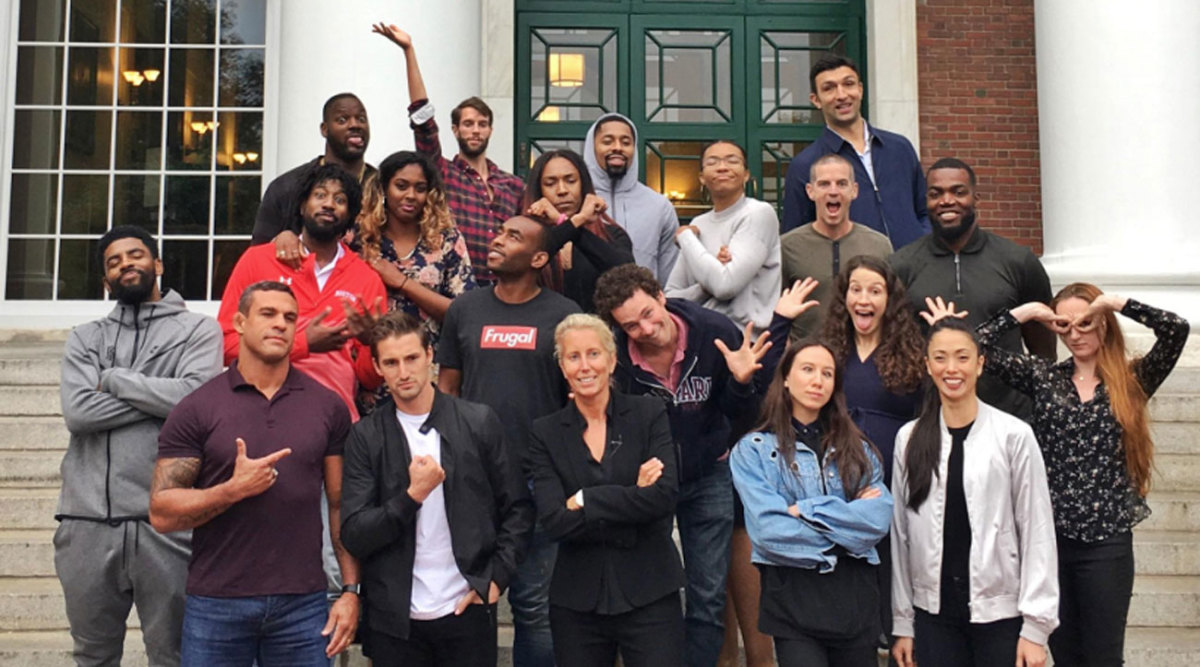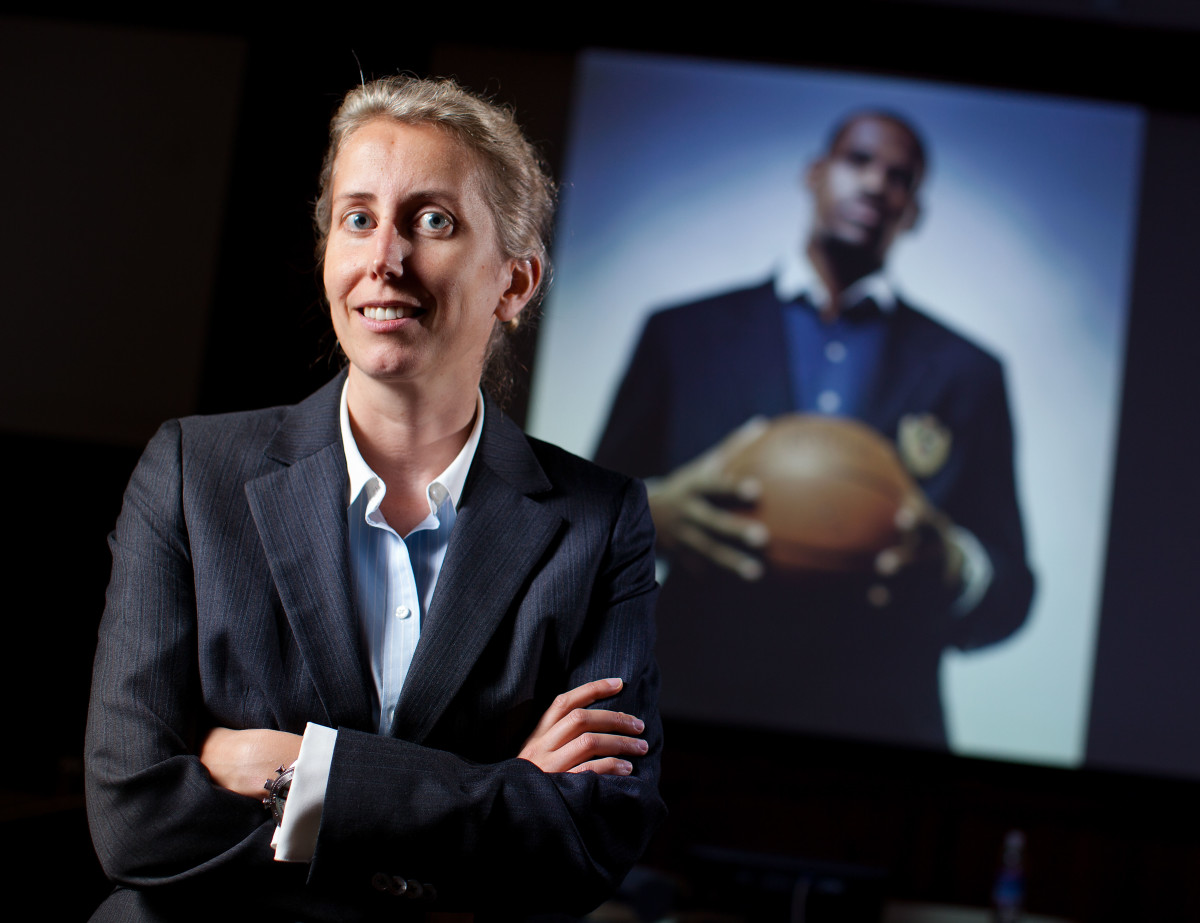With Harvard as the Backdrop, NBA Players Learn Business from the Best and Brightest

Taking a Harvard business class can be immensely intimidating and difficult. Now imagine how hard it would be to focus with a gaggle of athletic behemoths like Zaza Pachulia and Chris Bosh posted in the back of the class taking notes and judging your every move. That was the experience of Harvard MBA students who took part in Harvard professor Anita Elberse's Crossover Into Business program.
Athletes are quite interested in expanding their knowledge of business, especially when Elberse is teaching the class. What started with a handful of pros taking part in her standard classes at the Harvard Business School has now turned into a free, semester-long program designed specifically for athletes. The program started in 2017 and this past semester Elberse's third group of pro athletes completed the course.
NADKARNI: Is LeBron Still Chasing the Ghost of Michael Jordan?
“I’ve been running an executive education course for a little bit longer—so that’s been running for five years now. And that in turn is based on a course I do for the MBA students at Harvard. And that’s all about the business of entertainment media and sports,” Elberse says. “So I was getting more and more requests from athletes to be participants in the executive education program.
"And quite a few actually have done it. So Dwyane Wade was one of the first ones to do it in year two. We’ve had Chris Paul and Pau Gasol do it. Last year we had Gerard Pique, an F.C. Barcelona player. And this past year we had a whole bunch of other athletes do it including Lindsey Vonn and Michael Strahan and others. So there were more and more requests from athletes to be a part of the courses that I was doing.”

After NBA representives noticed the interest across the league and reached out, Elberse and others put together the mentor-based program that gives athletes insight into the business world by pairing them with second-year MBA students who share similar interests. The program, which started with only NBA players, has been expanded to include players from the WNBA and NFL, as well as NWSL and MMA fighters. During their day on campus, athletes sit in on Elberse’s traditional classes and get to pick their mentors through what the program coordinators called a “reverse draft.”
“Most of these athletes have been through draft processes by themselves or own their own, and so I think they were excited about being on the other side of the table,” student coordinator Wande Olabisi says. “And from the mentor side, they were very nervous. I mean, really excited to present to the athletes and pitch themselves as viable mentors, but also very nervous. So it was cool for them to kind of experience what may be just a tiny semblance of what it’s like to get drafted.”
“It was kind of a really funny experience because I think both sides admired and were sort of in awe of each other for different ways,” says Sarah Bullard, another student coordinator. “So the athletes have probably an unnecessarily high opinion of all the HBS students and think we’re all brilliant—which is or isn’t true depending on who you’re talking to. And I think from the mentors’ perspective, like Olabisi said, they were all super nervous and like so impressed and awestruck by these athletes, and in particular having these huge NBA players in the room, who just have this massive presence.”
Once athletes picked their mentors, they sat down and figured out what they would work on outside of the three business case studies they were required to examine. For Iman McGee-Stafford of the Atlanta Dream that meant huddling with her mentor and creating a small syllabus for the semester.
“We met at the kickoff and we sat down and talked about my goals, what I was about, like why I was doing this, what they were doing," says McGee-Stafford. "And then we had another follow up and had a long conference call, where we were talking about specifics. My big thing, because I am getting my non-profit off the ground right now, my goal for this was to flesh out business plans for the programs I want to do for my non-profit. So all of the case studies and everything we talked about was geared toward that.”
In addition to helping her gain a better understanding of what it will take to launch her Hoops and Hope Foundation, McGee-Stafford's mentors also helped her navigate the schedule while she was in season playing in China.
SHAPIRO: How the NBA's Worst Teams Should Proceed in 2019
Brooklyn Nets guard Spencer Dinwiddie also had to balance pro basketball with his course work, which was what he found to be the most difficult part of the program. But both McGee-Stafford and Dinwiddie agreed that their mentors did a great job working around their responsibilities. And not only did the mentors help them get through the semester with useful instruction, they were also inspired and forged relationships they expect to go last well beyond the conclusion of the program.
“My mentors were freaking awesome,” McGee-Stafford said. “Especially because during the semester I was in China, so we had to have crazy meeting times because of the time difference. … And one of my mentors actually wants to be on the board of a non-profit, so we’ll probably stay in touch and hopefully it will work out well.”
“My mentors both had past experience in finance and also in just the corporate world, and they were still very young," Dinwiddie said. "It was amazing to see people who had climbed the ladder fairly far to just try to you know what, ‘I know I’m making good money, I know I’m pretty good in my field, but I want to expand just to do more. So I’m going to drop out of this job, go back to school—back to Harvard—get this business degree and then re-enter the workforce.’ I thought that was special from both of them.”

The friendships and potential business partnerships that were formed during the program are a key piece in making it so memorable. But the actual information being learned goes a long way as well. McGee-Stafford, who just finished her third year in the WNBA following four years at Texas, said the course was a helpful add-on to the business degree she earned. The case studies discussed in the program introduced her to a parts of the business side she hadn’t fully considered, like getting equity on a deal or whether or not there would be cash paid up front. It also opened some people’s eyes to just how much money can be on the table for other athletes.
“Our first case was about LeBron James—when he was trying to decide whether he wanted to be on the cover of 2K, or make his own game with Microsoft or something with Xbox. And we were sitting there, and Kyrie [Irving] was in the room, who had just released his 2K cover,” McGee-Stafford says. “And he’s sitting there reading the details of the case, and he’s like ‘My deal wasn’t even this good.’”
Dinwiddie says the course didn’t provide him any sort of stunning realizations when it came to the inner workings of the business in sports, but it was “the most fun I had in college class”.
When Dinwiddie was picking colleges, he found himself deciding between Colorado and Harvard. He still sometimes thinkgs about what life could have been like if he chose to head to Cambridge, Mass., instead of Boulder, Colo.
MAHONEY: The AD Trade Hype Has Been Years in the Making
But this experience did help foster his desire to learn more. Dinwiddie says he doesn’t view learning as a short-term experience and he wants to finish up his degree from Colorado because he promised his mother he would. He also hopes to find peace in his career before he tackles that goal, but the semester at Harvard “does kind of revitalive that yearn for knowledge.”
While Dinwiddie's interest in school was a bit rejuvenated through the program, student coordinator Olabisi, who played college baseball at Stanford and spent three years in the minor leagues, saw this as a chance to help teach athletes in a way that could be more beneficial than what most experience during undergrad. He and Bullard are now being prepped for the spring semester, where they will once again oversee a group of 15 to 25 athletes and 30 to 50 mentors.
Whiles she's unsure whether the program will ever expand, Elersbe remains dedicated to providing athletes with an opportunity to learn the information and skills needed to prosper in an aspect of their careers the fans don’t watch as closely. And getting to see the players celebrate after their final presentations as if they just won a big game—either with a fist pump out of excitement or an exaggerated exhale out of gratification—serves as a reminder that there’s much more to these people than sports.
“I think we’re trying to break through this notion that some people have that they are an athlete, that’s all they have, and there’s nothing else that they can do," Elberse said. "Whereas I would argue that the kinds of skills that they learn as an athlete about being in high pressure situations, about learning to work in teams very often, about managing their own career from a very early age, these are really really helpful skills if you want to make a career in business as well. So very often they’re really well positioned to just jump onto the next thing.”
